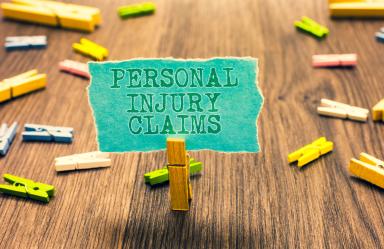Average Oilfield Accident Settlements [2024]
![Average Oilfield Accident Settlements [2023]](https://images.ctfassets.net/k00sbju4hbzq/3UTrHS2ibI3hPSPXzxeBQO/a44f73238d54e01fbaaaee93bb4c07aa/Depositphotos_71563707_XL.jpg?fit=fill&w=1200&q=75)
Personal injury lawsuits deal with situations where someone has suffered physical, mental, emotional, or, in some cases, reputational damage due to either the negligence or intentional misconduct of another person or group of people. In the United States, personal injury claims make up a considerable portion of civil litigation. It has been estimated that over 440,000 personal injury lawsuits are filed each year in this country. Recent data from the U.S. Department of Justice, Bureau of Justice Statistics indicates that roughly only 4% of those lawsuits actually go to trial. The majority of these types of cases are settled out of court, though in some instances, they may be dropped by one of the involved parties. There is no overall average settlement amount for a personal injury lawsuit. The amount of each settlement can vary considerably from case to case, depending on many different factors. In this article, we’ll look specifically at a more niche type of personal injury lawsuit: oilfield accidents.
Average Oilfield Accident Settlement Amounts
Working in an oilfield is a risky business. The Occupational Safety and Health Administration (OSHA) has provided some really insightful information about the job hazards associated with this industry. According to recent data shared by the CDC, a minimum of 470 workers in the field of oil and gas extraction died on the job between 2014 and 2019. Some sources have indicated that data related to oilfield injuries and fatalities may be underreported, so those numbers could actually be more. If you are curious about what the average settlement for an oilfield accident is, keep in mind that statistics about this topic can be vague, due to the fact that these types of settlements are often confidential. Additionally, every oilfield accident has its own unique set of circumstances that can impact the outcome of the settlement. Let’s explore some common types of accidents and injuries that could occur on an oilfield, bearing in mind that his list of examples is by no means exhaustive.
Fires and explosions
Due to the presence of highly flammable gasses and vapors and potential outside ignition sources, the risk of fires and explosions occurring on an oilfield is substantial. If a fire or explosion occurs in the proximity of workers, the damage can be significant. In recent years, attorneys representing victims of such accidents have reported winning settlements for their clients, ranging from one or two million dollars all the way up to $90 million in one case. The Deepwater Horizon oil rig explosion of 2010, which resulted in 11 deaths, 17 injuries, and around four million barrels of oil leaked into the ocean, ended in a settlement of $20.8 billion, one of the largest settlements in U.S. history.
Falls
For some oilfield workers, accessing platforms and equipment positioned high above the ground is part of the job. This places them at a high risk of injury from falls, even when proper safety precautions have been put into place. Workers who fall from extreme heights are in danger of a wide range of injuries, from smaller broken bones to traumatic head, neck and back injuries or even death. These types of injuries can be life altering. There have been multiple accounts of such falls. One such account reports to have resulted in a $15.2 million settlement for the oilfield employee who suffered severe back and neck injuries when they fell through an unbarricaded hole, but again, settlement payouts in these cases all differ.
Motor vehicle accidents
In the field of gas and oil extraction, it is often necessary to transport equipment and oil to and from remote drill sites. Driving long distances across remote areas while transporting large, cumbersome, and hefty equipment, as well as highly flammable and hazardous substances, can lead to tragic accidents. OSHA reports that highway vehicle collisions are the number one cause of worker fatalities in this industry. According to the Census of Fatal Occupational Injuries, approximately four out of ten workers killed on the job in the gas and oil extraction industry die as a result of a motor vehicle accident. These accidents don’t always result in fatalities, but they can result in very serious injuries and property damage.
Struck-by or caught-in situations
OSHA indicates that three out of every five workplace deaths in the oil and gas extraction industry are a result of “struck-by/caught-in/caught-between” situations. Falling equipment and tools, moving vehicles, heavy machinery, and high-pressure lines are common culprits in these accidents. Examples of settlements for these types of injuries have ranged from $160,000 up to several million dollars.
Factors That Influence Oilfield Accident Settlement Amounts
It is impossible to know in advance what your personal injury claim will be worth in the event of an oilfield accident. Every lawsuit has its own particular set of circumstances, and many factors that contribute to how damages in these cases are awarded. Thanks to OSHA standards, oilfield workers are afforded protections under federal law. These standards are meant to ensure the safety of employees in this industry, as well as that of the general public. When employers fail to adhere to regulations, the results can be catastrophic. How victims of oilfield accidents are compensated for such catastrophes may be based on some or all of the following.
Compensatory damages
Settlements in personal injury lawsuits may account for both tangible and intangible damages suffered by the victim. There are typically two main types of damages awarded in these lawsuits. Compensatory damages cover all the expenses that result from your injuries, including but not limited to:
Medical bills
Lost wages
Loss of future earning potential
Medical equipment and prescription costs
Special amenities needed to accommodate disabilities as a result of injuries
Funeral costs
Compensatory damages also account for intangible things, such as:
Physical, emotional, and mental pain and suffering
Diminished quality of life
The more traumatic and life-altering the injuries are, the more likely it is that the expenses related to them are going to add up. This will be taken into consideration when determining how much of a settlement a plaintiff should receive.
Punitive damages
Punitive damages may also be awarded in some cases, typically at the discretion of the court, if it is determined that the defendant needs stronger motivation to take action to ensure that similar accidents will not occur in the future. These types of damages are intended to punish the defendant for gross negligence or wrongdoing and possibly to send a message to others who may be inclined to behave similarly.
Assumption of risk
Assumption of Risk is a doctrine that argues that if a person undertakes an activity, understanding the dangers involved, they are knowingly assuming these risks. They may be barred from recovering damages stemming from any injury incurred while they voluntarily exposed themselves to danger. A defense attorney in an oilfield accident lawsuit may try to argue that workers in this industry undertake their jobs knowing the risks involved. As such, employers cannot be held responsible when injuries occur as a result of those risks.
Comparative negligence
Most personal injury cases are won when there is irrefutable proof that the defendant acted negligently and/or intentionally, thus resulting in the plaintiff’s injury. Some states have comparative negligence laws in place. Comparative negligence is the principle that the fault of each party involved in an accident depends on their individual contributions to that accident. When preparing a defense in an oilfield accident lawsuit, the lawyer for the defendant may try to argue that you played a role in causing the accident that led to your injuries. Damages would then be awarded according to the degree of fault assigned to you, thus limiting how much you could recover.
There is also something called modified comparative negligence, which several states have adopted. In states where this law applies, if it is determined that the victim is 50% or more (or, in some states, 51% or more) responsible for their own injuries, they would not be able to receive any damages.
Contributory negligence
This is another defense that a defendant’s attorney may use in some states. The idea behind contributory negligence basically asserts that there was a failure on the part of the injured party to act with caution, and in failing to do so, they contributed to their own accident and injuries. If this can be proven, a judge, jury, mediator, or arbitrator may choose to limit the amount of damages the victim can receive.
Pre-existing conditions
The laws in every state are different, but generally speaking, as long as the injuries received in an oilfield accident are new injuries and unrelated to any pre-existing conditions, having a pre-existing condition should not impact the damages awarded. If your injuries in some way exacerbate a pre-existing condition, they may, in fact, contribute to the argument that higher compensation is deserved.
How a Personal Injury Attorney Can Help Recover Compensation
Hiring an attorney can be intimidating if you’ve never done it before. It can also be expensive. In the case of a personal injury lawsuit, not hiring an attorney might be more costly for you overall. Studies show that plaintiffs who hire an attorney have a much higher success rate of winning their cases compared to people who represent themselves in a lawsuit. Your attorney’s knowledge of the law is invaluable when it comes to arguing on your behalf and ensuring that you receive the settlement you deserve. Outlined below are some of the ways an experienced and qualified personal injury attorney can help you recover the compensation you deserve in the wake of your oilfield accident.
Filing a complaint
After your initial consultation, your attorney will begin your lawsuit by drafting and filing a complaint with the courts. A strong complaint will do the following:
Identify all parties involved
Outline the details of the case against the defendant
Describe your injuries
Lay out the demands for judgment/relief (What are you asking for as compensation?)
The objective of the complaint is to make the defendant aware of your factual and legal claims.
Sending a written demand
In many states, you will be required to send a written demand letter to whomever you are suing. The letter is intended to make them aware of the impending lawsuit. When writing it, explain in detail what your injuries are. State what compensation you are requesting and/or how much you are willing to settle for outside of court. Provide your full contact information. The letter should be mailed via certified mail, with a return receipt requested. Before you send it, be sure to make a copy for your own records. Your attorney will be well-versed in this and will be able to help you draft an appropriate demand letter.
Filing a summons
After the complaint has been filed, you will also need to file a summons, which is a court document telling the defendant that a lawsuit has been filed against them. Once all of the necessary paperwork has been completed, the complaint, summons, and any other relevant documents will be delivered to the defendant through a legal practice referred to as “service of process.” You will then await their reply. They should respond with an indication of whether they admit to or deny the statements in your claim. Failure to respond to a summons puts the defendant at risk of automatically losing their case. Your attorney will give you peace of mind throughout all of this by knowing exactly which court documents need to be filed, when they need to be filed, and with whom.
Going through discovery
In preparation for your lawsuit, both sides will need to go through what is known as the discovery process. During this time, injury laws will be researched, claims will be investigated, and witnesses and experts may be interviewed. Whether or not your personal injury lawsuit goes to trial will depend largely on what is uncovered during the discovery process, as the information put forth directly impacts whether or not a settlement between the two involved parties can be reached during mediation or arbitration.
Proving liability
If the parties involved cannot reach an out-of-court settlement through mediation and/or arbitration, going to trial is the next step. In a civil lawsuit, the burden of proof lies with the plaintiff. This means it will be up to your attorney to prove that the defendants in your case were, in fact, responsible for your injuries. They will likely do so by demonstrating negligence on behalf of the defendants. They will use their legal expertise to gather the appropriate evidence and enlist the most relevant and qualified personal and expert witnesses.
Lawsuits are onerous. They can be quite emotionally draining. Many factors that determine whether or not your lawsuit will be successful. Without the help of a lawyer, the paperwork alone can be time-consuming and confusing. Working with the right attorney will give you the peace of mind that comes from knowing that your best interests are represented and that you are doing everything you need to be doing to guarantee you receive the appropriate settlement.
Expertise.com StaffAuthor
Step into the world of Expertise.com, your go-to hub for credible insights. We don't take accuracy lightly around here. Our squad of expert reviewers, each a maestro in their field, has given the green light to every single article you'll find. From rigorous fact-checking to meticulous evaluations of service providers, we've got it all covered. So feel free to dive in and explore. The information you'll uncover has been stamped with the seal of approval by our top-notch experts.




